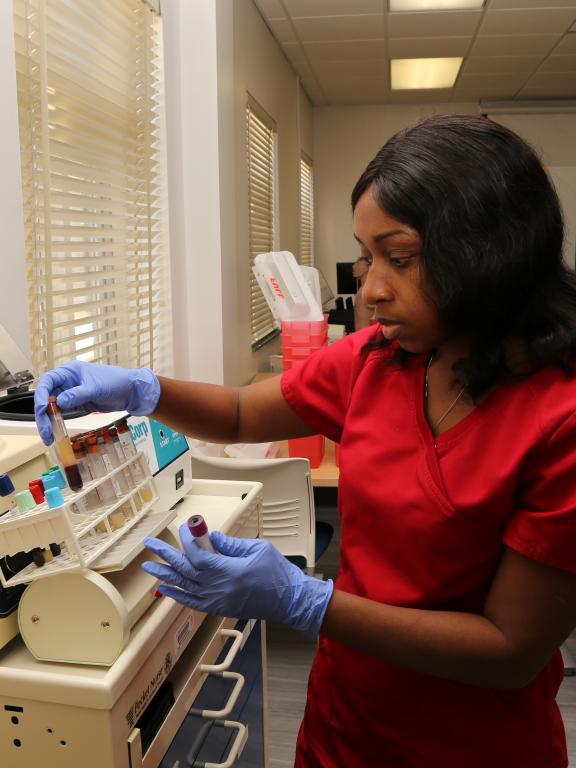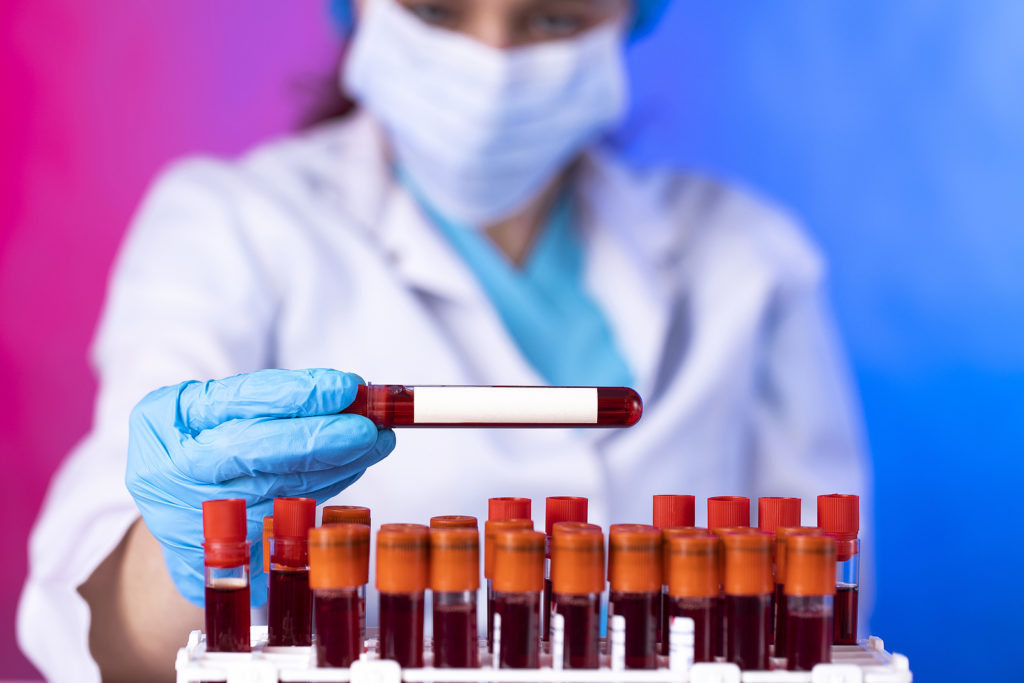10 Must-Have Skills You’ll Learn in a Phlebotomy school
10 Must-Have Skills You’ll Learn in a Phlebotomy school
Blog Article
The Path to Qualification: Understanding the Phlebotomy Training Program Trip and Its Importance
As you think about the path to accreditation in phlebotomy, it's crucial to recognize the role you'll play in health care. Your training will certainly cover crucial skills, from blood collection techniques to patient interaction.

The Duty of Phlebotomists in Medical Care
Phlebotomists play a crucial function in the health care system, working as the crucial web link in between individuals and important analysis testing. You'll do blood attracts, ensuring samples are accumulated precisely and safely. Your know-how assists in diagnosing clinical problems, keeping an eye on wellness, and leading treatment choices.
In your daily communications, you'll need to develop trust with individuals, making them feel comfortable throughout what could be a difficult experience. You are accountable for labeling and taking care of samples very carefully to avoid contamination or errors, which might influence test results.
Beyond this, you'll typically function alongside medical professionals and registered nurses, communicating essential information regarding people' conditions. By grasping your abilities, you add meaningfully to patient treatment, making you an indispensable part of the medical team.
Introduction of Phlebotomy Training Programs
When discovering phlebotomy training programs, you'll locate numerous types created to fit various routines and discovering styles. Each program helps you create essential abilities like blood collection and individual communication. Comprehending these choices is key to picking the appropriate course for your profession.
Sorts Of Educating Programs
Numerous kinds of training programs are offered for those looking to end up being proficient in phlebotomy. Additionally, some healthcare facilities and facilities provide on-the-job training programs, offering functional experience while you learn. Whatever course you pick, each program intends to furnish you with the necessary abilities for a successful phlebotomy job.

Secret Skills Established
Grasping phlebotomy requires a collection of crucial abilities that are developed through thorough training programs. Additionally, interaction abilities are basic; you'll need to connect with patients, describe treatments, and placed them at simplicity. Each of these abilities is necessary for your success as a certified phlebotomist, making you an important possession in any type of healthcare setup.
Key Components of a Phlebotomy Training Course
In a phlebotomy program, you'll focus on essential topics that prepared for your future career. You'll engage in hands-on training that enables you to apply what you have actually discovered in real-world setups. Both the core educational program and useful experience are vital for your success as a phlebotomist.
Curriculum Summary
While pursuing a phlebotomy training course, you'll run into a curriculum designed to outfit you with basic abilities and understanding. Phlebotomy school. This curriculum normally consists of composition and physiology, concentrating on the circulatory system and comprehending blood elements. You'll additionally learn more about various kinds of blood collection techniques, including venipuncture and capillary slit techniques
Furthermore, infection control and safety procedures are essential components, guaranteeing you know how to preserve a clean and sterile setting. You'll research patient communication, highlighting communication and empathy, which are crucial for reducing client anxiety. Finally, moral and lawful considerations will certainly be resolved, preparing you for real-world responsibilities. This foundational expertise will enable you to stand out as a phlebotomist and provide high quality care in medical setups.
Hands-On Training Experience
Obtaining hands-on experience is an essential part of your phlebotomy training program. This useful training allows you to apply what you've discovered in a real-world setting, improving your abilities and confidence. You'll practice venipuncture techniques, discover how to take care of different kinds of specimens, and get acquainted with the tools made use of in the area. Under the support of experienced trainers, you'll fine-tune your skills, ensuring you're gotten ready for any type of scenario you could encounter.
Furthermore, you'll get the opportunity to communicate with people, which is important for creating your interaction skills. This mix of technological proficiency and social skills is crucial for your success as a certified phlebotomist. Inevitably, hands-on training is where theory meets technique, solidifying your expertise and readiness for certification.
Qualification and Licensing Needs
Prior to you can begin your career in phlebotomy, it is important to recognize the certification and licensing demands that differ by state. Most states call for phlebotomists to hold a certification from an identified organization, such as the National Phlebotomy Association or the American Society for Professional Pathology. These certifications typically entail passing an examination that evaluates your expertise and abilities in the area.
Along with qualification, some states have particular licensing demands. You may require to finish a specific number of hours in medical practice, submit evidence of training, or undertake a background check. It is necessary to investigate your state's guidelines to see to it you fulfill all needed standards.
Remaining notified regarding these needs not only assists you protect a position yet additionally enhances your integrity as a professional. By satisfying these requirements, you'll be well on your method to an effective job in phlebotomy.
Hands-On Training and Practical Experience
Hands-on training and useful experience are crucial elements of your phlebotomy education and learning, as they allow you to apply academic knowledge in real-world circumstances. Throughout your training, you'll take part in supervised venipuncture, learn proper methods, and come to be accustomed to numerous blood collection devices. This straight participation is critical for developing your self-confidence and sharpening your skills.
You'll work very closely with experienced specialists who can direct you via the nuances of individual interaction and example handling. Each practice not just strengthens your understanding yet likewise prepares you for the busy atmosphere of medical care settings.
Additionally, lots of programs include professional turnings, permitting you to experience diverse settings, from healthcare facilities to outpatient clinics. This exposure helps you adjust to different difficulties and person requirements, ensuring you're well-prepared for your future role. Embrace these chances, as they're important to ending up being a skilled and caring phlebotomist.
Obstacles Dealt With Throughout Training
While gaining hands-on experience is important, you could look here it's essential to acknowledge the difficulties that can occur during your phlebotomy training. You could run into anxiousness when executing treatments on actual clients, specifically if you're brand-new to the environment. The stress to get everything right can be overwhelming. Additionally, grasping the abilities needed for blood draws takes practice; you may have a hard time with strategy initially.
Time monitoring can likewise be a difficulty, as harmonizing theory, sensible sessions, and personal dedications can really feel challenging. You might encounter differing discovering speeds visite site amongst your peers, bring about feelings of insecurity if you think you're falling back. Adapting to the different characters of instructors can be difficult, as each might have a distinct teaching design.
Identifying these barriers at an early stage can prepare you for success and assist you establish strength throughout your training journey.
Job Opportunities After Qualification

As you acquire experience, you might even think about focusing on locations like pediatric or geriatric phlebotomy, satisfying specific individual requirements. Some phlebotomists choose to advance their jobs by ending up being research laboratory specialists or going after additional education and learning in healthcare areas.
In addition, your certification can Click Here result in duties in training or monitoring brand-new phlebotomists, enabling you to share your understanding. With the healthcare sector consistently growing, your skills will always remain in demand, leading the way for a secure and satisfying occupation. Accept the chances awaiting you!
Often Asked Concerns
What Is the Normal Duration of a Phlebotomy Educating Program?
Phlebotomy training courses usually last around four to eight weeks. You'll participate in hands-on technique, classroom guideline, and online discovering. Finishing this training prepares you for accreditation and a satisfying career in health care.
Are Online Phlebotomy Courses Available?
Yes, on the internet phlebotomy training courses are offered. They offer flexibility and benefit, permitting you to research at your very own pace. Simply verify the program is recognized to meet accreditation demands and gain important skills for your occupation.
How Much Does Phlebotomy Training Usually Price?
Phlebotomy training generally sets you back in between $700 and $2,500, relying on the program and place. You ought to consider elements like training course size, consisted of products, and hands-on experience when picking the appropriate training for you.
What Prevail Prerequisites for Phlebotomy Training?
Usual prerequisites for phlebotomy training often consist of a high college diploma or GED, booster shots, and a history check. Some programs may likewise require standard health care expertise or certifications, guaranteeing you're prepared for hands-on training.
Can I Work While Completing My Phlebotomy Training?
Yes, you can work while completing your phlebotomy training. Numerous pupils balance jobs with their studies, but make sure to handle your time efficiently to assure you fulfill both work and training commitments effectively.
Report this page